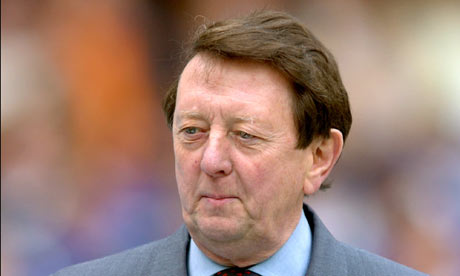
Orwell's description of Britain as a family with the wrong members in charge has always applied to English football, where, despite the vast wealth and glamour of the Premier League, the national team have not reached a World Cup final since 1966. The chances of the 2018 global tournament reaching its climax at Wembley have receded again with this latest bout of infighting.
England's World Cup bid must now proceed without the Premier League's figurehead, Sir Dave Richards, whose reasoning for standing down will give increasingly sceptical Fifa voters fresh cause for mirth. Richards said: "I can now best support a successful bid without the necessity of sitting on the board." In other words, the Premier League, a powerful independent republic within the national game, would like to help the bid by not being part of it.
This comes 11 days before sport's plutocrats assemble for the draw for Africa's first World Cup, in Cape Town, where the ubiquitous David Beckham will lead the English parade. For 2006, the faultlines in England's candidacy were arrogance, presumption and an inability to play politics as well as the Germans, who believed they had a gentlemen's agreement with the Football Association not to block Euro 96 (which was staged in England) in return for a clear run at the 2006 World Cup.
This time, vanity and resentment are playing havoc with the submission, which has been described as "lightweight" by Jack Warner, a leading Fifa powerbroker, and has already endured the obligatory free-gift brouhaha. The Mulberry handbags intended to delight the wives of Fifa's 24 executive committee members ended up being wielded against England's bid with a force Lady Thatcher would have envied.
The real story here is a ram-raid by the Premier League on the FA chairman and former New Labour apparatchik, Lord Triesman, who aroused the hostility of the top 20 clubs by attacking their levels of corporate debt. Triesman's belief that the English game is borrowing itself to oblivion has some validity. But it placed him on a crash course with a league that is now more powerful than the FA, itself weighed down by Wembley's construction cost and losses. Yesterday Richards took revenge.
This self-indulgent wrangling may already have ruined England's case to bring the game it invented "home" for the first time in more than 50 years. If the feuding chieftains cannot run a bid, why should they be trusted to run a World Cup? Few at Fifa will want to reward this self-destructive behaviour if Spain and Portugal, Russia and Australia can mount a more convincing argument.
Footballing cathedrals adorn the English landscape. The infrastructure of road, rail and hotels is adequate, if overpriced. But we prefer our side drama of power games and mutual handbagging. An assumption of England's bid is that the mother country "deserves" another World Cup after such a long wait. It's getting harder to say that with a straight face.

